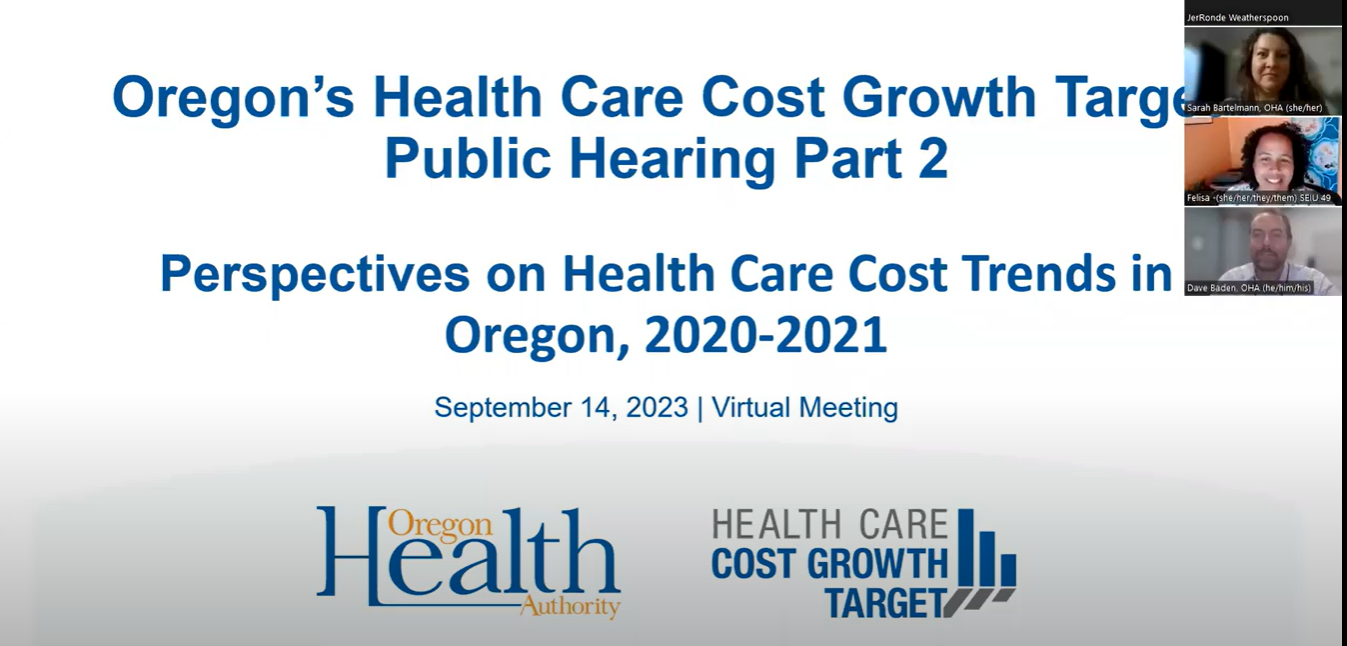Oregon brings together hospitals and health insurers to discuss health care cost growth trends

This month, Oregon held a public hearing to hear perspectives from hospitals and health insurers, including Regence BlueCross BlueShield of Oregon, about health care cost growth trends and strategies to address them.
The hearing centered on the May 2023 release of the first data related to the state’s health care cost growth benchmark program. The report finds Oregonians’ total health care spending increased by 3.5% between 2020 and 2021, just above the 3.4% target benchmark. The Oregon Legislature established the Sustainable Health Care Cost Growth Target Program, run by the Oregon Health Authority, to control rising health care costs.
Health care cost growth trends 2020-2021
Health care costs are complex and multiple factors affect the overall cost landscape. Primary factors in 2020-2021 included:
COVID-19: Both hospitals and health insurers agree 2020 was an anomaly because of COVID. At the outset of the pandemic, health care costs surged due to increased demand for testing, treatment, and hospitalization of COVID patients. But during the height of pandemic, many people postposed elective procedures and non-urgent care.
Pent-up demand: As health care systems returned to more normal operations in 2021, a backlog of postponed procedures and preventive care services contributed to increased spending as utilization picked up.
Rising health care prices: Prescription drugs and treatment costs have increased considerably as utilization returned to pre-COVID levels and show no signs of abating. Health insurance reflects the cost of care, and this squeezes everyone: employers struggling to offer coverage, people trying to afford their own premiums and cost share, and governments under budgetary pressure to manage taxpayer-funded health programs.
Strategies to rein in health care costs
There is no one-size-fits-all solution to reining in health care costs, nor is it a one-player game. It takes all parts of the health care system working together to find sustainable solutions. Hearing participants discussed:
Value-based care: Shifting fee-for-service to value-based care models to encourage a focus on patient outcomes and cost-effectiveness instead of volume of services provided.
Alternative sites of care: Coordinating care among medical providers and settings to offer patients affordable alternatives to expensive hospitals without sacrificing quality of care.
Preventive care: Emphasizing preventive care and early intervention to help reduce the need for costly treatments and hospitalization.
Negotiating drug prices: Negotiating with drug companies and hospitals and promoting generic medications, among other things. For example, Regence is a national leader in the adoption of biosimilars – generic versions of biologic drugs that represent some of the most expensive treatments in the U.S.
Health information technology: Investing in health information technology such as AI to improve personalization and engagement for health insurance members and patients.
Sustainable Health Care Cost Growth Target Program
Oregon is the fourth state to set a health care cost growth benchmark program. Reporting from other states with similar programs show cost increases far exceeding their targets. Oregon’s first round of reporting is encouraging, but ongoing research and evaluation are crucial to understanding cost drivers at their source and which mitigation strategies work best.
Regence remains committed to working with the program staff, policymakers, and other stakeholders to create an economically sustainable health care system for Oregonians.

